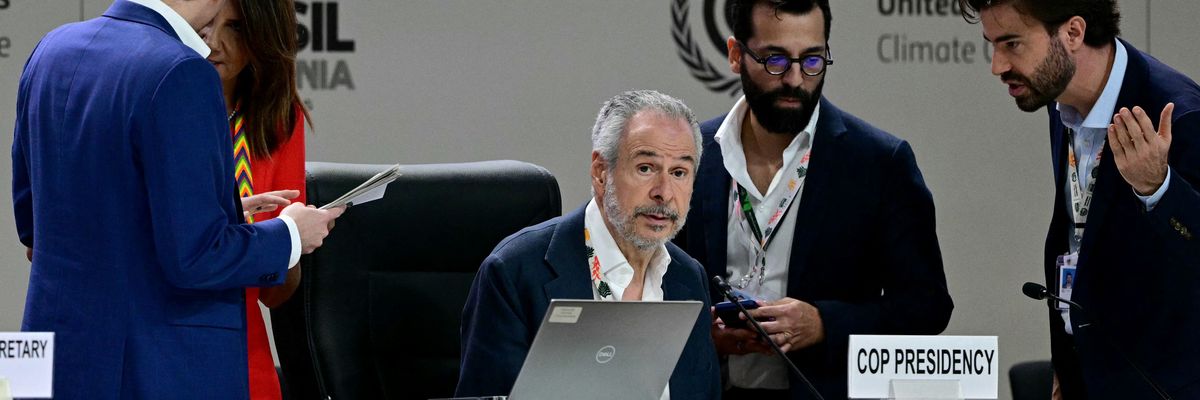Climate advocates voiced alarm and outrage Friday after every mention of fossil fuels was dropped from the latest draft text to emerge from the COP30 summit, high-stakes talks that have been swarmed by a record number of oil and gas lobbyists seeking to derail any progress toward a clean energy transition.
Dozens of nations—including Spain, Vanuatu, the Marshall Islands, Chile, and Germany—are demanding that any final agreement include "a roadmap for implementing a just, orderly, and equitable transition away from fossil fuels" to fulfill world leaders' previous commitment at COP28.
But a draft document released by COP30 host Brazil on Friday, formally the last day of talks, omits any such roadmap and does not even contain the term "fossil fuels."
Monique Barbut, France's environment minister, said Friday that "at this point, even if we don't have the roadmap, but at least a mention of the fossil fuels, I think we would accept it."
"But as it stands now, we have nothing left," Barbut added.
While draft texts are not necessarily a definitive measure of the state of negotiations, the omission was seen as further evidence that United Nations climate talks have been captured by petrostates such as Saudi Arabia and fossil fuel industry influence-peddlers. At COP30, fossil fuel lobbyists outnumber the delegations of every country except Brazil.
The Donald Trump-led United States, the world's largest oil producer, did not send an official delegation to the summit.
"This is outrageous," Bronwen Tucker, public finance lead at Oil Change International, said in response to the new draft text. "The presidency has presented a shamefully weak text that fails to mention fossil fuels, fails to deliver accountability towards rich countries’ finance obligations, and only makes vague promises on adaptation."
"A large group of countries have been vocal in their support for a roadmap to transition away from fossil fuels, but rich parties are still refusing to deliver the debt-free public finance on fair terms that is key to make it happen," Tucker added. "Until they stop blocking efforts to address the systemic barriers developing countries face to phasing out fossil fuels, any roadmap will be a dead-end."
"We’re walking a fine line here between survival and climate catastrophe."
The updated text was released as negotiators raced to strike a consensus deal in the final hours of the summit, which appears likely to head into overtime. Talks were delayed for hours on Thursday after a fire broke out at the summit, an incident that activists viewed as a "potent metaphor" for world leaders' failure to combat the climate crisis as it wreaks havoc across the globe.
"We’re walking a fine line here between survival and climate catastrophe, and in these final hours I am hoping we can take something back to our communities that indicates that the world considers our homes worth fighting for,” said Fenton Lutunatabua, Pacific team lead at the climate group 350.
Nikki Reisch, director of the Climate and Energy Program at the Center for International Environmental Law, said Friday that the toothless draft text lays bare the need to overhaul the COP process and mitigate the influence of the fossil fuel industry—the primary driver of the climate emergency.
"The world is being sold a bill of lies here at this 'COP of truth,'" said Reisch. "We can’t have a deal that fails to deliver what science and the law require on finance, fossil fuels, or forests and call that progress. The weakness of the text underscores why the climate talks are sorely in need of reform to allow a majority vote when a handful of countries block consensus."




